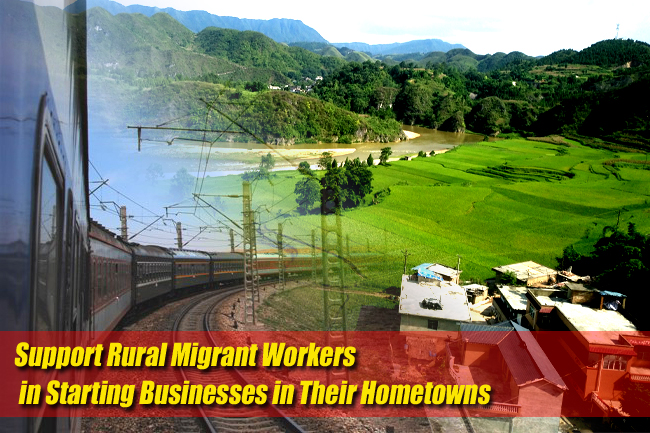Support Rural Migrant Workers in Starting Businesses in Their Hometowns
2017-11-16

By Cui Chuanyi, DRC
2017-8-10
After the Guideline on Supporting the Rural Migrant Workers to Start Businesses in Their Hometowns was released by the General Office of the State Council, this issue has attracted close attention from various social circles. According to the statistics published by the National Bureau of Statistics of China, the total number of rural migrant workers in China reached 280 million by 2016. It is worth studying how many of them have become urban residents and how many have returned to their hometowns to make start-ups as this issue is significant for the development of rural areas and even for the whole country.
Businesses started by rural migrant workers in their hometowns are cornerstones for developing rural areas. Since reform and opening-up, migrant workers have experienced several major events in different periods in making business start-ups in their hometowns. The first event is related to the establishment of household contract responsibility system in rural areas, which had exerted an enormous impact on agriculture, farmers and rural areas. The second event is relevant to the emergence of rural enterprises around the cities in China’s coastal areas, whereas rural enterprises were rarely seen in the central and western areas. After the establishment of household contract responsibility system in rural areas, many farmers from the central and western areas left their hometowns and went to the eastern coastal cities for employment. The third event is due to the fact that with social and economic development, some farmers working in the cities settled down there and became urban residents and some others chose to return to their hometowns and start businesses there.
The issue of rural residents starting businesses in their hometowns is a major issue for China’s rural development. Indeed, farmers’ business start-ups are nothing new and as early as in the 1990s, some farmers already made business start-ups in their hometowns. If we look at the big picture, we could find that the costs of resources and environment have all been raised through the long-term development in the eastern coastal areas, while in the central and western areas the advantages of resources, industries and ecological environment with a low cost have become gradually enforced through years of infrastructure construction. Meanwhile, the workforce costs in eastern coastal areas have gradually gone up and the costal industries have transferred from the eastern areas to the central and western areas, thus providing the driving force for rural migrant workers to return to their hometowns and start businesses. In addition, after working in the cities for over ten-odd years, the rural migrant workers have gained knowledge and enhanced their technical ability through their work in industrial sectors and city markets and their experience has enabled them to alleviate the shortage of entrepreneurial personnel in the central and western areas and helped these areas to speed up development. Overall, the effects of rural migrant workers’ business start-ups are much more important than in the past as their business start-ups have played an active role in addressing the structural conflicts and the accumulated problems in China’s central and western areas.
Businesses started by the rural migrant workers in their hometowns can be categorized into the following four aspects. First, some small and micro-enterprises and agricultural-based enterprises have been generated and these enterprises bear some major features. 1. These enterprises are small in scale but large in number. 2. These enterprises are open-oriented at grassroots levels. 3. These enterprises boast great potential of development. Second, the rural migrant workers’ self-reliant businesses are market-oriented and adaptable to local conditions, which enjoy a diversified development prospect and play a leading role in economic restructuring. Third, these enterprises have propelled innovations through introducing the technologies of the coastal areas to their hometowns, upgrading the technical know-how and making relevant original innovations. Fourth, these enterprises have provided local people with more jobs so that the people could earn more money and lift themselves out of poverty.
Rural migrant workers are still facing some difficulties in starting their businesses including inadequate information channels, restrictions on land renting and fund raising. It is also difficult for them to improve technical capacities of their enterprises and seek government and non-government support. In addition, the government would keep an eye on large enterprises while neglecting farmers’ small businesses, and some local governments do not think that rural migrant workers can play a principal role in making start-ups. The last but not the least is that related policy measures are not widely made known to the people.














